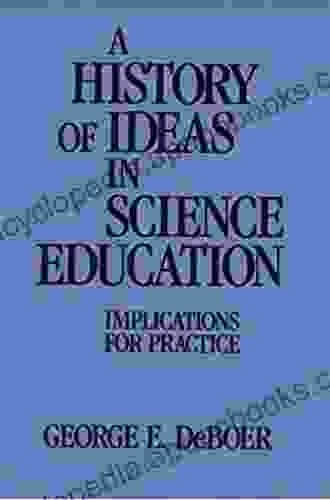Unveiling History's Impact on Science Education: A Profound Journey

In the annals of knowledge transmission, science education stands as a beacon of progress, illuminating the path to scientific literacy and fostering critical thinking skills. However, to fully grasp the present landscape of science education, we must delve into its rich and complex history, where ideas have shaped and reshaped our understanding of teaching and learning in this essential field.
Ancient Roots: Laying the Foundation
The foundations of science education can be traced back to the ancient Greeks. Philosophers such as Plato and Aristotle emphasized the importance of observation, reason, and deduction in understanding the natural world. Plato's Academy and Aristotle's Lyceum became centers of learning, where students engaged in scientific discussions and conducted experiments.
4.7 out of 5
| Language | : | English |
| File size | : | 599 KB |
| Text-to-Speech | : | Enabled |
| Screen Reader | : | Supported |
| Enhanced typesetting | : | Enabled |
| Word Wise | : | Enabled |
| Print length | : | 284 pages |
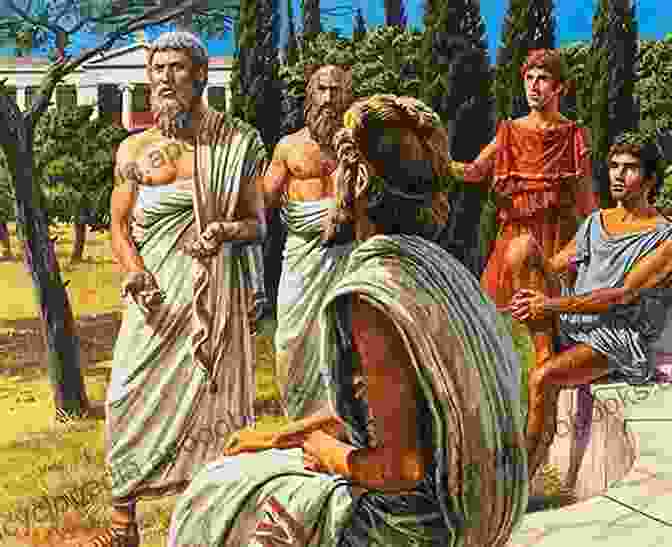
Medieval Transformations: From Authority to Inquiry
During the Middle Ages, the influence of the Church and the rise of universities had a profound impact on science education. While religious dogma often dominated scientific inquiry, scholars like Roger Bacon advocated for observation and experimentation. Universities became hubs of intellectual debate, encouraging students to question established knowledge and pursue scientific investigations.
Renaissance and Reformation: A Scientific Revolution
The Renaissance and Reformation brought about a renewed emphasis on human reason and the scientific method. Nicolaus Copernicus' heliocentric model challenged centuries-old beliefs about the Earth's place in the universe. Francis Bacon's inductive approach to science revolutionized scientific inquiry, emphasizing the importance of observation and experimentation.
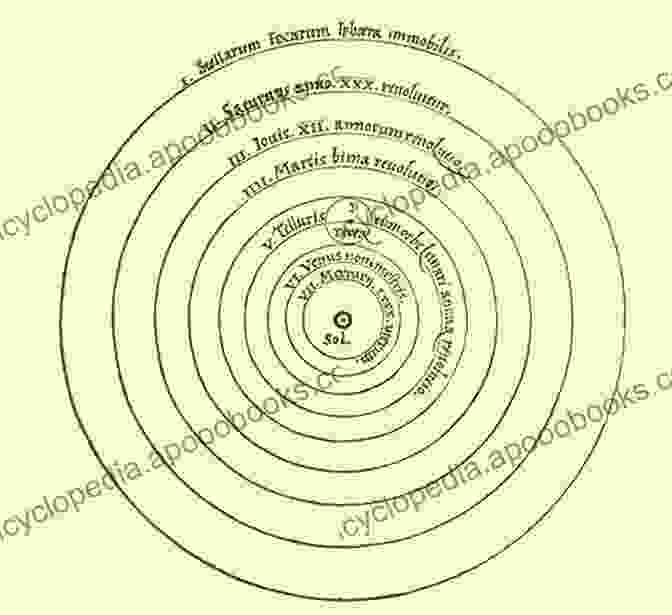
Enlightenment and Industrialization: Advancing Scientific Literacy
The Enlightenment witnessed a surge in scientific discovery and a growing awareness of the importance of scientific literacy. Philosophers such as John Locke and Jean-Jacques Rousseau advocated for education that emphasized the development of reason and critical thinking. Industrialization created a demand for a more scientifically knowledgeable workforce, leading to the establishment of science curricula in schools.
19th and 20th Centuries: The Rise of Pedagogy and Psychology
The 19th century saw the emergence of pedagogy as a field of study. Educators began to explore different methods of teaching science effectively. In the 20th century, the influence of psychology had a significant impact on science education, with Piaget's theory of cognitive development shaping approaches to teaching science to children.

Contemporary Perspectives: Embracing Diversity and Technology
In the 21st century, science education continues to evolve, embracing diversity and leveraging technology. There is a growing focus on making science education more inclusive and accessible to all students, regardless of background or ability. Technology has become an integral part of science instruction, offering students new ways to engage with scientific concepts and conduct investigations.
The history of science education is a tapestry woven with threads of innovation, exploration, and discovery. From the ancient Greeks to contemporary classrooms, ideas have illuminated the path to scientific literacy and critical thinking. By understanding the evolution of science education, we can better appreciate the challenges and opportunities that lie ahead in fostering a future generation of scientifically literate citizens.
4.7 out of 5
| Language | : | English |
| File size | : | 599 KB |
| Text-to-Speech | : | Enabled |
| Screen Reader | : | Supported |
| Enhanced typesetting | : | Enabled |
| Word Wise | : | Enabled |
| Print length | : | 284 pages |
Do you want to contribute by writing guest posts on this blog?
Please contact us and send us a resume of previous articles that you have written.
 Book
Book Novel
Novel Page
Page Chapter
Chapter Text
Text Story
Story Genre
Genre Reader
Reader Library
Library Paperback
Paperback E-book
E-book Magazine
Magazine Newspaper
Newspaper Paragraph
Paragraph Sentence
Sentence Bookmark
Bookmark Shelf
Shelf Glossary
Glossary Bibliography
Bibliography Foreword
Foreword Preface
Preface Synopsis
Synopsis Annotation
Annotation Footnote
Footnote Manuscript
Manuscript Scroll
Scroll Codex
Codex Tome
Tome Bestseller
Bestseller Classics
Classics Library card
Library card Narrative
Narrative Biography
Biography Autobiography
Autobiography Memoir
Memoir Reference
Reference Encyclopedia
Encyclopedia A K Khurana
A K Khurana Jw Wilson
Jw Wilson Kathy Dee
Kathy Dee Simon Turney
Simon Turney Velox Books
Velox Books Becky Tallentire
Becky Tallentire Stephan Collishaw
Stephan Collishaw Ray Mcallister
Ray Mcallister Benjamin Levin
Benjamin Levin Laura Bennett
Laura Bennett Suzanne Weyn
Suzanne Weyn Mick Twemlow
Mick Twemlow Ronald E Kearns
Ronald E Kearns Mark Johnston
Mark Johnston Dr Howard Jeffrey Bender
Dr Howard Jeffrey Bender Austin Sanderson
Austin Sanderson Doug Boyce
Doug Boyce 7th Edition Kindle Edition
7th Edition Kindle Edition Vikram Sampath
Vikram Sampath Lillian Guerra
Lillian Guerra
Light bulbAdvertise smarter! Our strategic ad space ensures maximum exposure. Reserve your spot today!
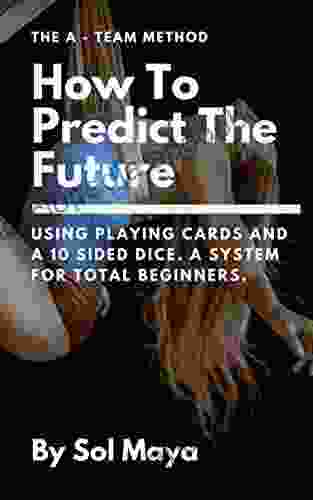
 Marvin HayesUnveiling the Secrets of Tomorrow: A Comprehensive Guide to Predicting the...
Marvin HayesUnveiling the Secrets of Tomorrow: A Comprehensive Guide to Predicting the...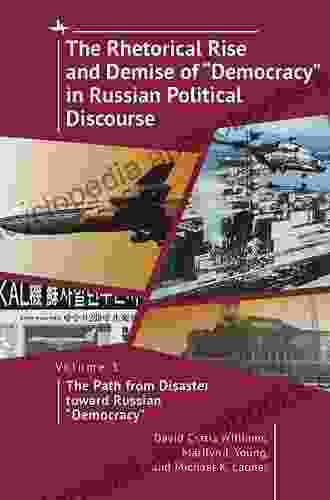
 David MitchellUnveiling the Path From Disaster Towards Russian Democracy: A Comprehensive...
David MitchellUnveiling the Path From Disaster Towards Russian Democracy: A Comprehensive...
 Clarence BrooksUnlock Effortless Weight Loss: Discover the Revolutionary Approach of "The...
Clarence BrooksUnlock Effortless Weight Loss: Discover the Revolutionary Approach of "The... Hugo CoxFollow ·5.9k
Hugo CoxFollow ·5.9k Alfred RossFollow ·12.1k
Alfred RossFollow ·12.1k Calvin FisherFollow ·3.4k
Calvin FisherFollow ·3.4k Dillon HayesFollow ·9.4k
Dillon HayesFollow ·9.4k Gavin MitchellFollow ·10.6k
Gavin MitchellFollow ·10.6k Jayson PowellFollow ·15.5k
Jayson PowellFollow ·15.5k Clarence BrooksFollow ·19.2k
Clarence BrooksFollow ·19.2k Brett SimmonsFollow ·19.2k
Brett SimmonsFollow ·19.2k

 Jacob Hayes
Jacob HayesUnlock the Power of Microsoft Word: A Comprehensive Guide...
Microsoft Word is a widely used word...
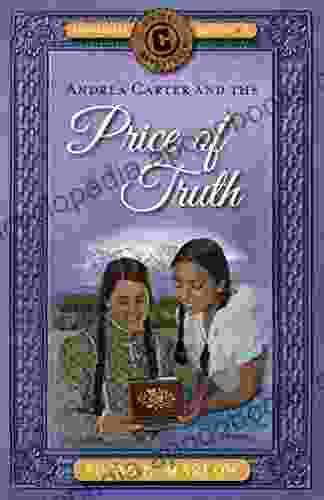
 Hunter Mitchell
Hunter MitchellAndrea Carter and the Price of Truth: A Thrilling...
Get ready for an unforgettable...

 Ivan Turner
Ivan TurnerTrading Jeff and His Dog: An Unforgettable Adventure of...
Get ready for an emotional rollercoaster...

 Langston Hughes
Langston HughesGo Viral TikTok: The Ultimate Guide to Gaining 100K...
TikTok has emerged as a social...

 Ibrahim Blair
Ibrahim BlairUnveil the Enchanting Realm of Short Fiction: Dive into...
Delve into a Literary Tapestry of...

 Tennessee Williams
Tennessee WilliamsUnveil the Enchanting World of Elizabeth Barrett...
A Poetic Tapestry of Love, Loss, and...
4.7 out of 5
| Language | : | English |
| File size | : | 599 KB |
| Text-to-Speech | : | Enabled |
| Screen Reader | : | Supported |
| Enhanced typesetting | : | Enabled |
| Word Wise | : | Enabled |
| Print length | : | 284 pages |


